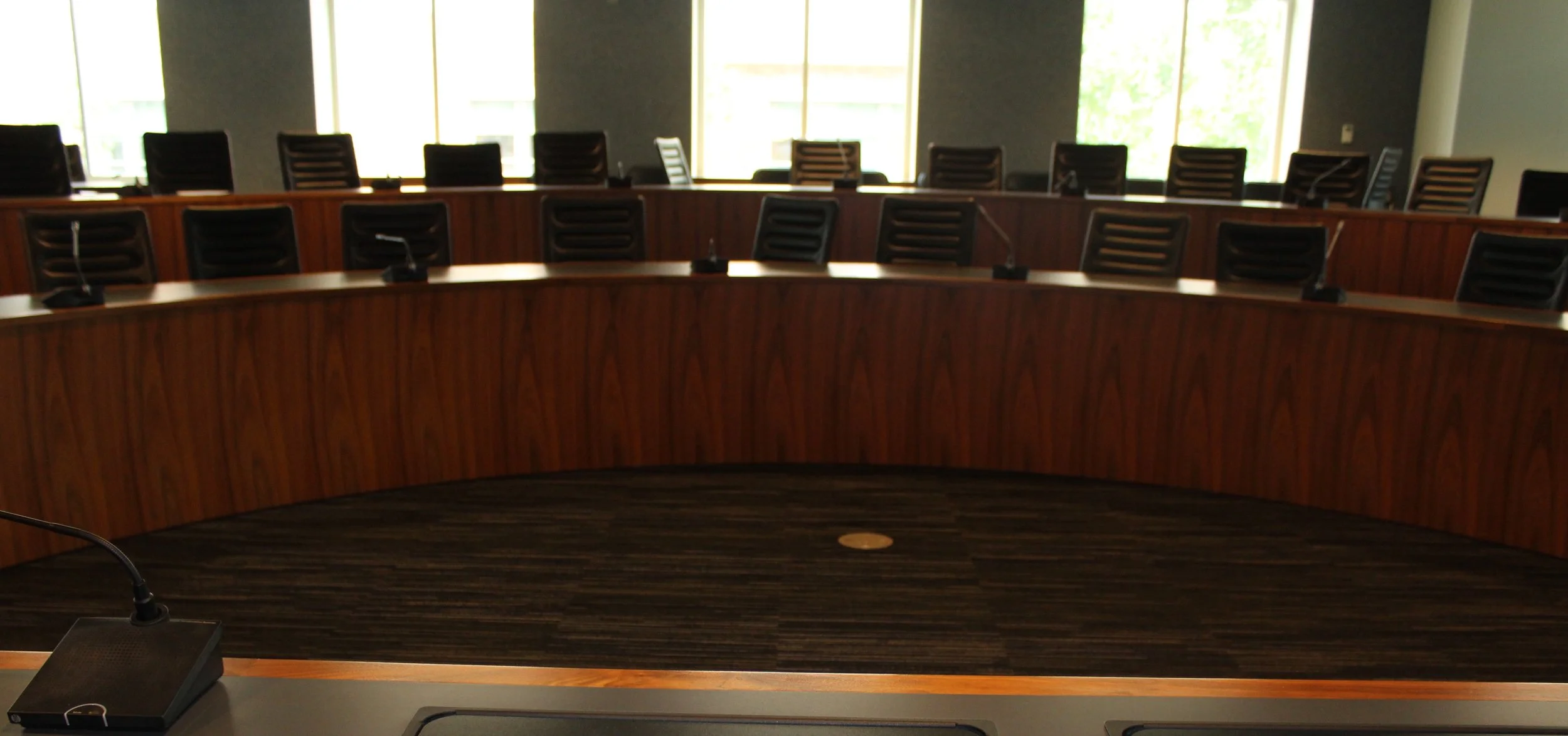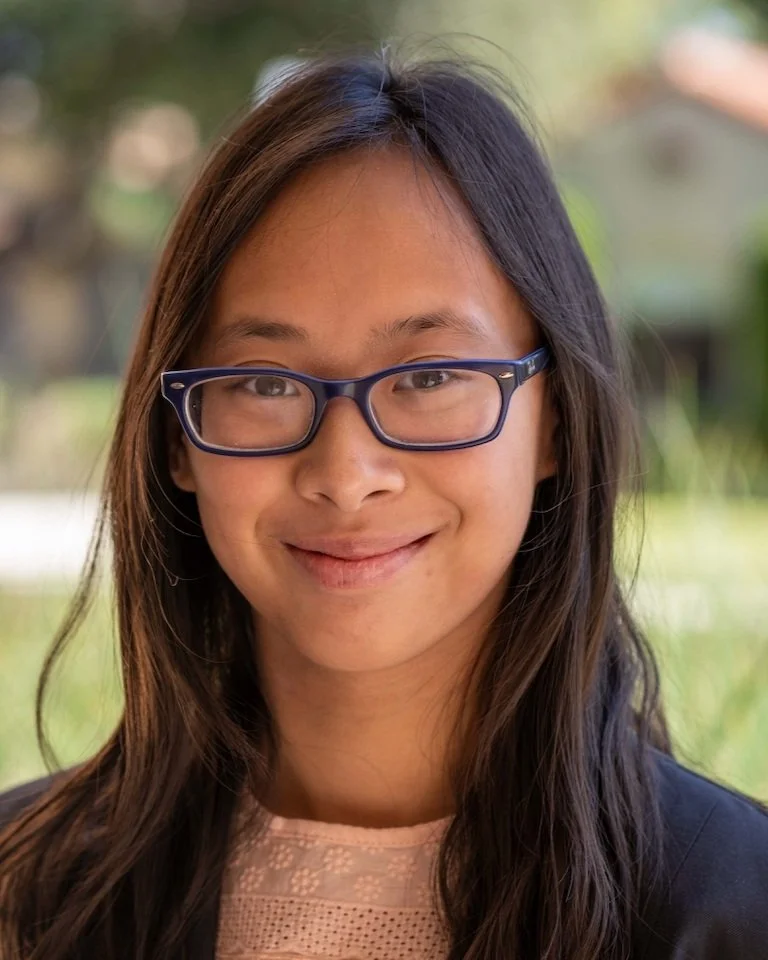Q&A | Meet the two candidates running for SGA vice president
Riya Belani and Tiffany Le are the two candidates running for SGA vice president. Photo from The Panther Archives
Voting for the new Student Government Association (SGA) president and vice president opened Monday, March 6 and will close Wednesday, March 8. There are two candidates running for president as well as two candidates for vice president.
In lieu of a formal, in-person debate, The Panther sent over the following questions to all four candidates. Students can vote online here.
The candidates’ answers have been lightly edited for clarity and stylistic standards.
Meet the candidates for president here.
Riya Belani is one candidate running for SGA vice president. Photo courtesy of Anya Nguyenkhoa, SGA Director of Elections
Riya Belani
Junior, current Upperclassmen Senator
Q: Some students/club leaders are unsatisfied with SGA regarding event hosting and funding. What will SGA do to help these clubs that don't feel heard or feel like they are not getting the timely response/funding they need for events?
A: SGA is committed to best supporting the orgs on campus. Last week, a meeting was held with orgs on campus and SGA members to address the concerns brought to us about the current funding process. One of my goals in running for VP is to strengthen the connections between SGA and student orgs to streamline funding processes and better support the needs of orgs/clubs on campus. SGA has already been working with the student orgs department to provide training about funding and event planning, and I hope to continue such trainings and make the information given in president’s meetings more pertinent to the needs of clubs and orgs on campus.
Likewise, I want to update the website to include step-by-step guides on how to request funding as well as ways to mark certain funding requests as particularly time sensitive. I also want to work to find a place on campus for clubs and orgs to store their items, especially SGA-funded items that they would be willing to lend to other clubs so that we are able to support the needs of more clubs and orgs by not having to fund similar items multiple times for different organizations that could be shared instead. This would also help when club leadership transitions as club items would be able to be stored on campus and not in club leaders’ homes.
Finally, I am advocating for more support for SGA’s Allocations Committee so that they are able to see more funding requests and better determine a decision about each request.
Q: What initiatives are you planning to increase diversity, equity and inclusion (DEI) efforts on campus?
A: As the current Diversity Affairs Committee Chair, DEI is one of my utmost priorities. This past year, our committee along with members of the executive council have worked to create the Sodexo Recipe form, find resources for monthly DEI PR posts, founded the Cross Cultural Center coalition, passed a DEI SGA bylaw,and hosted DEI training for senate in collaboration with the DEI office.
Some plans I have to advocate for different communities on campus include continuing to work with Sodexo and Residence Life to create a system for people to request takeout meals during religious fasting periods like Ramadan. I also want to bring back/promote safe space training for faculty to create more places for LGBTQIA+ students to talk/confide in members on campus. During my freshman year at Chapman, I was part of the Diversity Project and worked with the status of LGBTQIA+ group to remake the safe space training to have more up-to-date and inclusive language. After faculty and staff complete this training, they are able to display a safe space logo outside of their office, signifying that they are open to talking to and supporting LGBTQIA+ students.
Since the training has been created, it is ambiguous as to whether it has been offered to staff and faculty or if the program is well known, so I want to revive it and put that training that was workshopped for a year to use.
Q: What initiatives are the candidates most interested in funding and/or creating in order to improve a positive campus atmosphere?
A: Some other initiatives that I am interested in creating to improve the campus atmosphere are improving first-year/transfer student success resources. I believe that starting students out with a strong understanding of the campus resources will lead to an overall more involved and happier campus, and new students will feel more at home and be able to get involved easier, which will carry on in their future years. Some ways of doing this include adding more clear and detailed information about Title IX procedures at Chapman, including more health information pertinent to laws in California (which is especially important as our student body comes from all around the globe) and connecting students with all of the resources that Chapman has to offer like RAs, orientation Leaders, FFC Coordinators, Student Psychological Counseling Services, You at Chapman, Disabilities Services, Involvement Coaches and the Fish Interfaith Center.
I also want to bring back the CU Mentor Program, which connects students to faculty mentors. This program was integral for me and some of my peers freshman year, and I would love to start it up again to connect students with mentors to help them better understand their career goals and create a path for them to reach their goals.
Q: What is one thing that you would want to change about Chapman and how SGA is running currently? How would you go about this?
A: Currently, SGA’s internal affairs could definitely be improved, and the VP usually oversees internal affairs. I want to see more internal and external collaboration from all members of SGA, as well as more transparency as a whole from the organization. I feel like students are not using senator office hours to connect with SGA, so I want to shift our effort to more senate tabling and campus outreach events like town halls to hear from the student body and understand their needs and concerns.
I also want to focus on senate success by having check-ins with Internal Committee Chairs and creating monthly progress reports to be more transparent with what senate is working on, as well as reaching out to all departments on campus to create an updated External Committee list and delegating senators to those groups. Finally, I want to improve senate training to make the transition for new members of SGA a lot smoother and include implicit bias training, rules/protocol training and DEI training for all members of SGA.
Q: Since the topic of mental health is so prevalent across campus, what mental health initiatives would you want to put into place if you are elected to your position?
A: This year, I was able to be a part of the Mental Health and Wellness Committee in SGA, and through this committee, we worked to create different ideas to better mental health on campus. There is definitely a need for more therapists/clinicians in the SPCS, but outside of advocating for more funding/support being given to the SPCS, I want to connect students with all of the resources that are currently offered on campus and create more safe spaces for students.
I also want to advocate for particularly stressed populations on campus like athletes and the RA staff by making aspects of their roles more manageable so they face fewer instances that negatively impact their mental health — like more scheduling support for athletes off-season so they are able to properly eat and take care of themselves around off-season practice and not expecting RA staff to act as first responders for serious mental health crises, especially with the little training or support they receive. Resources on campus can be highlighted through a Mental Health Resource Fair and Town Hall.
Q: What is the one overarching goal you hope to accomplish if elected into your position?
A: On top of all of the ideas I have listed above and continuing with the work that the current executive council has started, my main overarching goal I have is to improve the inner workings of SGA so that we can do so much more good for campus. By making the organization more efficient and making senate more collaborative, we will be able to best address the needs of our student body from student orgs funding and event planning to promoting mental health and DEI resources to overall advocating for each college/school/group on campus and making sure their voices are heard through their elected officials.
Tiffany Le is one candidate running for SGA vice president. Photo courtesy of Anya Nguyenkhoa, SGA Director of Elections
Tiffany Le
Sophomore, current Fowler College Senator
Q: Some students/club leaders are unsatisfied with SGA regarding event hosting and funding. What will SGA do to help these clubs that don't feel heard or feel like they are not getting the timely response/funding they need for events?
A: I cannot speak on behalf of the entire Student Government Association and the plans that will be fulfilled and implemented. With that being said, these are the proposed ideas I would like SGA to implement for clubs to feel heard and to receive timely responses and funding for their events:
In-Depth Training about the SGA Funding and Student Organizations policies for all voting members of SGA.
Have the public Allocations Committee meeting minutes (notes) be taken more in-depth by a finance assistant or Director of Finance.
Continual support of SGA Funding workshops
Transparent, Structured “Pipe-line” on how funding requests are reviewed and check requests are being paid out
Open dialogue and encouragement to attend SGA’s weekly senates to speak about rising concerns
Throughout the past year as the Allocations Chairperson, I have come to have a better understanding of how the committee functions both internally and externally. In doing so, I’ve seen a lack of connection and follow-through, which has caused a separation between the student body and SGA. With that in mind, I want to prioritize creating a safe space where people feel both seen and heard. This is especially important to me because, through a more open dialogue, both SGA and I can better serve the student body's needs.
Q: What initiatives are you planning to increase diversity, equity and inclusion (DEI) efforts on campus?
A: In order to have diversity on campus, we need to break down the barrier that can inhibit a student’s ability to attend this campus or any institution. The most common factors that deter a student from attending Chapman or other institutes are the costs, distance from home, academics, location, etc. “Summer melt” is a common problem, especially among lower-income and first-generation college students. Many high-school graduates who have been accepted and planned to enroll will oftentimes lose their opportunity to attend if they do not obtain sufficient financial aid, miss important deadlines, or lack support from family and friends.
As a first-generation college student, I was fortunate enough to be a part of the Promising Futures Program Summer Bridge program, which allowed me to receive more personal connections with current students. My initiative would extend that idea to all freshman and transfer students. Around May, Orientation Leaders will be announced of their selection, and this is an excellent opportunity for OLs to connect with the first-year class. The OLs would be a great point of contact for incoming first-year students to receive information and ask questions about college. This would allow a more personal connection with the first-year class throughout the Summer leading up to Orientation Week and Move-in.
Q: What initiatives are the candidates most interested in funding and/or creating in order to improve a positive campus atmosphere?
A: The four primary initiatives that I would be most interested in advocating for are:
Sustainable transportation
A textbook relief program
Mental health and wellness
Smooth transitions between the old and new Senate and Executive Board
For sustainable transportation, the advocacy piece centers on more sustainable transportation, such as skateboard storage and rentable bikes for free or at a lower cost. The idea is to mirror what SGA has already advocated and funded for in the past with the Laptops-To-Go program, which allows students to rent laptops from a kiosk in Argyros Forum. Similarly, having rentable bikes will enable students, especially those living on campus, to bike around the city of Orange to run errands.
For the textbook relief program, the advocacy piece centers around having a fund on campus that students can apply for to alleviate the cost of their textbooks. There are three different options that could occur: the immediate access program (loan system for textbooks), book vouchers (vouchers for the bookstore) and/or reduced homework cost (a fund that is catered towards paying for online homework cost–Cengage, ZyBooks, etc.)
I will explain the mental health and wellness initiative in an upcoming question. Lastly, the proposed initiative is to have a more formal transition meeting between the old and the new senate for a smooth transition. While the transition for the president and vice president spans over a longer period, the senators have a much shorter transition period. Having a more established transition meeting and FAQs would be really helpful to allow for a quicker and more efficient transition. A more efficient transition allows us SGA to move smoothly (during transition period) to stay focused and engaged with our tasks and responsibilities–reviewing funding requests, advocacy, and leadership.
Q: What is one thing that you would want to change about Chapman and how SGA is running currently? How would you go about this?
A: I believe that SGA is an important institution at the university, but it has lost major components of collaboration and communication over the years. COVID-19 has impacted a lot of campus life worldwide, and in the adjustments coming out of the pandemic, we have not been able to bring back all the pieces we had prior. At the end of the day, Chapman University and SGA are here to better the undergraduate experience and campus atmosphere.
College is the time in our lives when we explore the world and become more in tune with who we are. We’re growing so many skills for life after college while learning how to be functioning adults contributing to society. We are the next generation of change, and now is truly a starting point for building the idea of vulnerability.
"We Are Chapman" is a really special piece of our campus and a vital part of redefining what it means to be a part of the Chapman community. In the growing gap between SGA and the community, there has also been an increase in individual biases and the perpetuation of stereotypes. As leaders on campus, we are tasked with being unbiased and fair because we act as the bridge between the student body and the administration.
We are the individuals with the voices speaking for our constituencies, which means representing ALL of them, despite any personal opinions or grievances that have formed through stereotypes. We are in a position to break down the barriers that have developed through mass generalizations, and it is important to remind one another of that ability.
Q: Since the topic of mental health is so prevalent across campus, what mental health initiatives would you want to put into place if you are elected to your position?
A: I was fortunate to serve on the 2021-2022 SGA Mental Health and Wellness Subcommittee, and the committee did research on the eight interconnected dimensions of wellness: emotional, physical, occupational, intellectual, financial, social, environmental, and spiritual. In this world of scarcity, these dimensions can all affect the mental health of a college student. Often, students find it hard to prioritize and balance their mental health with school, responsibilities, and involvement.
With that being said, it would be beneficial to host an event or create a questionnaire form that will redirect a student to the correct resources such as Psychological Counseling services, Tutoring Center, Fish Interfaith, etc. (to cater towards a specific wellness dimension). Furthermore, the current Psychological Counseling service on campus is severely understaffed.
An initiative I would like to take is to have more therapists available and employed. Additionally, I would like to work with the Psychological Counseling services and the SGA Mental Health and Wellness subcommittee to create a guide of other nearby institutions/clinics that may be more affordable and/or take insurance that students can go to. Additionally, a significant initiative would be making the prevalent topic of mental health more accessible at organized meetings, town halls or open forums. This will be a way to make the conversation more accessible and provide a space for communication to hear how organizations talk about mental health, what’s lacking and what needs to be advocated for. Like Dani Smith’s C.A.R.E.S student volunteers, there would be a similar group of students led by an advisor who serves as trained peer advisors.
Q: What is the one overarching goal you hope to accomplish if elected into your position?
A: Connection. Connection is simply why we’re all here. We want a sense of connection with ourselves, our friends, our identities, academics, the surroundings of nature, our involvements, and everything that encompasses who we are and what Chapman is.



